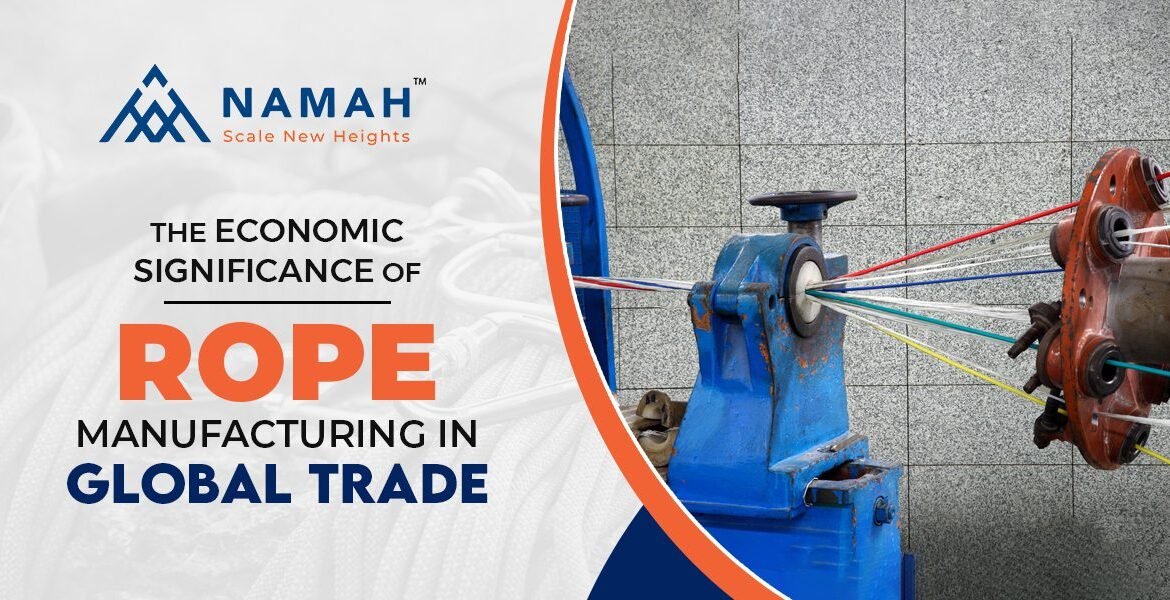Introduction to the Rope Manufacturing Industry
Rope manufacturing, an often-overlooked cornerstone of global industries, plays a critical role in various sectors including maritime, construction, sports, and more. Let us explore how the rope industry not only supports a vast array of economic activities but also significantly contributes to global trade dynamics.
The Historical Context and Evolution of Rope Manufacturing
Rope making, dating back thousands of years, has evolved from twisted natural fibers to sophisticated synthetic materials designed for specific applications. This evolution reflects broader economic shifts and advancements in material science, which have expanded the market reach of rope products worldwide. Understanding this historical progression provides insight into the industry’s current economic impact and its role in international trade.
Key Materials and Technological Advancements
Modern rope manufacturing utilizes a variety of materials, including polypropylene, nylon, and UHMWPE (Ultra-High Molecular Weight Polyethylene), each selected for its unique properties such as strength, durability, and resistance to environmental factors.
Technological advancements in extrusion and braiding have not only improved the quality and versatility of rope but have also enhanced production efficiency, making it a significant player in the industrial sector.
The Global Supply Chain of Rope Manufacturing
The rope industry’s supply chain is a complex network spanning multiple continents. Raw materials are often sourced globally, with synthetic polymers and natural fibers coming from diverse regions. This international sourcing is necessary to meet the industry’s high standards and varied material requirements.
Impact on Global Trade
The export and import of rope play a crucial role in balancing trade between countries. Major manufacturing hubs in Asia, Europe, and North America export large quantities of rope to countries lacking domestic production capabilities. This trade is vital for industries like shipping and fishing, which rely heavily on high-quality ropes for daily operations.
Economic Drivers and Trade Barriers
Trade policies, tariffs, and international relations significantly influence the rope trade. For instance, changes in trade agreements can either boost rope exports by reducing tariffs or hinder them through increased trade barriers. Understanding these dynamics is essential for stakeholders in the rope manufacturing sector to navigate the global marketplace effectively.
Economic Contributions of Rope Manufacturing to Global Markets
Job Creation and Workforce Development in Rope Manufacturing
The rope manufacturing industry is a significant source of employment and skills development, particularly in regions with strong industrial bases. Let us examine how the industry contributes to job creation and the broader economic benefits that arise from a skilled workforce.
Employment Opportunities Across the Globe
Rope manufacturing plants offer numerous jobs, from technical roles in engineering and materials science to operational positions in production and logistics. These jobs often require specialized skills, contributing to higher education and training standards within local economies. The industry’s demand for a diverse range of professional skills helps boost employment rates in both developed and developing nations.
Training and Education Impact
The need for a skilled workforce in rope manufacturing drives investment in vocational training and higher education sectors. Manufacturers often collaborate with educational institutions to create specialized courses that cater directly to the industry’s needs, fostering a new generation of workers who are well-versed in advanced manufacturing techniques and materials science.
Innovation and Technological Advancements in Rope Manufacturing
Innovation is a key driver of economic growth within the rope manufacturing industry. Continuous improvements in rope technology not only enhance product offerings but also create new market opportunities.
Research and Development (R&D) Investments
Significant investments in R&D by leading rope manufacturers lead to innovations in materials and manufacturing processes. These innovations can increase efficiency, reduce costs, and open up new applications for ropes in various sectors such as renewable energy (e.g., offshore wind farms) and critical infrastructure.
Patents and Intellectual Property
The development of new rope technologies often results in patents and intellectual property (IP), which can provide substantial economic benefits to companies through licensing deals or exclusive production rights. This aspect of the industry not only boosts company revenues but also contributes to national economic indicator.
Sectoral Contributions of Rope Manufacturing to Critical Industries
Supporting Global Infrastructure with Advanced Rope Technologies
The rope manufacturing industry plays a pivotal role in supporting and enhancing global infrastructure projects. Here, we will explore the critical contributions of advanced ropes in key sectors such as construction, maritime, and energy, highlighting their impact on safety, efficiency, and economic stability.
Ropes in Construction and Engineering
Ropes are indispensable in the construction industry, used in everything from lifting heavy materials to securing structures. The development of high-strength, durable ropes has enabled the construction of taller skyscrapers, longer bridges, and more complex structures. This capability not only drives the construction sector forward but also stimulates economic growth through infrastructure development.
Enhancing Safety and Efficiency
The use of advanced ropes significantly increases the safety and efficiency of construction projects. They reduce the risk of accidents, improve the speed of operations, and enable the execution of projects in challenging environments, such as high winds or at great heights.
Maritime and Shipping Industry Reliance on Robust Ropes
The maritime sector, which includes shipping, fishing, and offshore energy extraction, relies heavily on rope technology for operations. Ropes used in these environments must withstand harsh conditions, including saltwater exposure, extreme weather, and heavy loads.
Impact on Shipping and Logistics
Ropes are critical for mooring ships, towing vessels, and handling cargo. The efficiency and safety of these operations directly affect global trade efficiency, highlighting the economic importance of high-quality rope manufacturing in maintaining and enhancing international trade routes.
Innovations in Rope Technology
Recent innovations, such as ropes with integrated sensors that monitor stress and wear, are set to transform maritime operations. These smart ropes can lead to safer, more reliable maritime activities, further solidifying the rope industry’s role in this sector.
Future Prospects and Trends in Rope Manufacturing
Emerging Trends and Innovations in Rope Technology
The future of rope manufacturing is shaped by continuous innovation and emerging market demands. Furthermore, let us explore upcoming trends in the industry, how they align with global economic shifts, and the potential impact on various sectors.
Advancements in Material Science
The development of new materials that are stronger, lighter, and more environmentally friendly is driving the rope industry forward. Innovations such as nanotechnology and biopolymers are expected to produce ropes with enhanced functionalities, opening up new applications in sectors like aerospace and biotechnology.
Sustainable Manufacturing Practices
As global emphasis on sustainability increases, rope manufacturers are turning towards greener production methods. This includes recycling old ropes, using renewable materials, and reducing energy consumption in manufacturing processes. These practices not only help preserve the environment but also cater to the growing consumer demand for sustainable products.
Expanding Market Opportunities
The global expansion of industries such as renewable energy, adventure sports, and telecommunications presents new opportunities for rope manufacturers. For example, specialized ropes are needed for the installation and maintenance of offshore wind turbines, which is a rapidly growing sector.
Impact on Global Trade
The ability of rope manufacturers to innovate and adapt to these new markets will play a crucial role in their economic success. By staying at the forefront of technology and market trends, they can enhance their international competitiveness and contribute to global economic growth.
Strategic Partnerships and Collaborations
To leverage these opportunities, rope manufacturers are increasingly engaging in partnerships and collaborations with research institutions and other industries. These collaborations help accelerate innovation and adapt products to meet specific needs, such as high-performance ropes for extreme environments.
Namah Ropes specializes in manufacturing high-quality ropes, harnesses, and slings, catering to various industries including safety, climbing, and industrial applications. Renowned for its commitment to innovation and quality, the company leverages state-of-the-art technology and materials to ensure its products meet the highest standards of safety and performance. Namah Ropes also emphasizes sustainability in its manufacturing processes, aiming to minimize environmental impact while delivering durable and reliable products.




